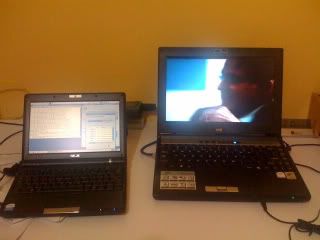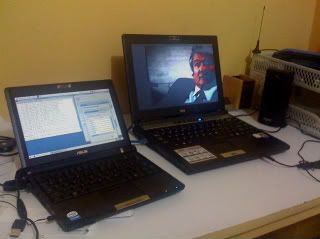 It's quite a busy week for me work-wise, we've been planning on setting up a product launch for the GPS tracking solution we've been developing since last year, so its really nice for the weekend to come and allow me a day of R and R. This also means that I have time to blog about another passion of mine and that is making music.
It's quite a busy week for me work-wise, we've been planning on setting up a product launch for the GPS tracking solution we've been developing since last year, so its really nice for the weekend to come and allow me a day of R and R. This also means that I have time to blog about another passion of mine and that is making music.I've practically been a music fan all my life. When I was a little kid, my sister and I sang along songs we heard on the radio. My earliest percussion instruments were my mom's collection of aluminum and steel pots, my main instrument however, was my father's comb, which I had covered with paper on one side and sang through it to generate vocal buzzes much like a kazoo. But it really wasn't until 6th grade when I signed up for our school's guitar club that I really got into making 'real' music (Thanks sir Jacinto for triggering the musician in me).
When I got introduced to computers (which came in late in my life), I wanted to incorporate computers into music, or at least make use of software to either make the whole music making concept easier or make it more interesting
 . My first attempts were obviously recording applications like SoundForge (which was the primary application used in the recording studio where I worked on a couple of years ago), later I got into Cakewalk and other similar applications. These apps were very good with their respective areas but now that I'm leaning more into FOSS(Free & Open Source Software) I've been scouting applications that can replace these tools.
. My first attempts were obviously recording applications like SoundForge (which was the primary application used in the recording studio where I worked on a couple of years ago), later I got into Cakewalk and other similar applications. These apps were very good with their respective areas but now that I'm leaning more into FOSS(Free & Open Source Software) I've been scouting applications that can replace these tools.Here's a list of a few applications that can definitely help musicians like me that are looking for FOSS alternatives to popular proprietary music applications.
- Audacity. A free, open source software for recording and editing sounds in Linux, Mac OS X , and other operating systems. This is a good SoundForge replacement and is also being used for voice and audio analysis.
- Hydrogen. An advanced drum machine for GNU/Linux. It's main goal is to bring professional yet simple and intuitive pattern-based drum programming. Quite easy to use and given the right drum kits (which are also free!) can produce very life-like sounds. I've used it to produce the drum tracks for my demos.
- JACK. A system for handling real-time, low latency audio (and MIDI).
- JACK Control. Offers a user interface for controlling the JACK sound server daemon. At the same time it figures as a JACK patch bay and monitoring tool.
- Ardour. A digital audio workstation. You can use it to record, edit and mix multi-track audio. You can produce your own CDs, mix video soundtracks, or just experiment with new ideas about music and sound. Its very close to ProTools and has a completely flexible "anything to anywhere" routing system, and will allow as many physical I/O ports as your system allows.
- Creox. A real-time sound processor that mimics guitar effects. Its not as powerful as GuitarRig but for simple needs this is more than enough.
- GT-6 Fx FloorBoard. A midi editor for the Boss GT-6 floor effects. A recent discovery that got me really excited. This app allows me to control the GT-6, mix and modify effect settings as well as load and save my patches. In my experience the linux version worked even better than the windows version :). Finally a software that rivals GT-Manager!
- Tuxguitar. An opensource multitrack tablature editor. This is a great compositional tool and works quite the same way as Guitar Pro except that this one not only read and writes GPx files but Powertab files as well. Beat that!
- Linux Multimedia Studio (LMMS). free cross-platform alternative to commercial programs like FL Studio, which allow you to produce music with your computer. This includes the creation of melodies and beats, the synthesis and mixing of sounds, and arranging of samples. You can have fun with your MIDI-keyboard and much more; all in a user-friendly and modern interface.
- Ubuntu Studio. A multimedia creation flavor of Ubuntu. Ubuntu Studio is aimed at the GNU/Linux audio, video and graphic enthusiast as well as professional.
There are of course more applications for the FOSS musician than what I have listed and I will definitely post them in the future. But the list above contains most of the really good ones. Moreover, by installing Ubuntu Studio I'm pretty sure you'll encounter more applications that will fit your needs.
 Before I end this blog, I'd like to show-off my Ubuntu shirt! :)
Before I end this blog, I'd like to show-off my Ubuntu shirt! :)
I had commissioned a friend 2 weeks ago to create the artwork for the Ubuntu shirt I'm currently wearing (unfortunately, the yellow paint partially wore-off) .
This will serve as my 'gig' shirt on my band's next gig or it can also be my shirt on the next DabaweGNU L & K session :)
 Before I end this blog, I'd like to show-off my Ubuntu shirt! :)
Before I end this blog, I'd like to show-off my Ubuntu shirt! :)I had commissioned a friend 2 weeks ago to create the artwork for the Ubuntu shirt I'm currently wearing (unfortunately, the yellow paint partially wore-off) .
This will serve as my 'gig' shirt on my band's next gig or it can also be my shirt on the next DabaweGNU L & K session :)





